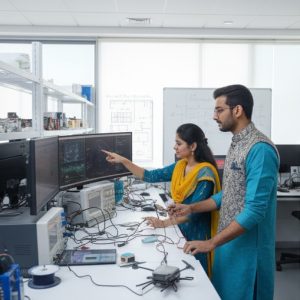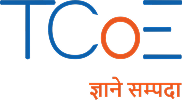IoT Data/ Analytic Engineer Course
The IoT Data / Analytics Engineer Course focuses on transforming raw data from connected devices into meaningful insights and intelligent decisions. It covers IoT data acquisition, storage, processing, analytics, visualization, and the application of machine learning techniques to sensor data. Through hands-on projects and real-world use cases, learners gain practical experience in handling large-scale, real-time IoT data streams. This course prepares participants for industry-relevant roles at the intersection of IoT, data analytics, and smart decision-making systems.
- 182 Hours (2 hours/day x 6 days/week x 6 weeks) OR at your own pace
- Hindi, English
- Learn & Get Certified
- Basic & Intermediate
- Hands-On Training


Online Course Fees
Offline Course Fees
About this course
The IoT Data / Analytics Engineer Course is a 30-hour advanced training program.
It is designed as an add-on to the 152-hour IoT Engineer Master Course, bringing the total duration to 182 hours, and enabling learners to progress from building IoT devices to analyzing, interpreting, and visualizing IoT-generated data for real-world decision-making.
Through theory and hands-on practice, learners develop skills in data acquisition, preprocessing, cleaning, normalization, and feature engineering using sensor datasets. The course introduces essential analytics techniques including statistical modeling, anomaly detection, trend analysis, and time-series forecasting, along with practical applications of Python, NumPy, Pandas, Matplotlib, and Scikit-learn. Participants also learn how to work with IoT dashboards, cloud platforms, NoSQL databases, message brokers, and REST APIs to manage and analyze streaming IoT data.
Learners gain experience in building predictive and descriptive analytics pipelines, designing real-time dashboards, and integrating machine learning models with IoT systems for actionable insights.
The course concludes with a project where participants develop a complete IoT data-analytics workflow, transforming raw sensor data into meaningful predictions and visual reports.
By the end of the program, participants are equipped to:
-process and analyze large-scale IoT datasets,
-develop ML-based insights for IoT applications, and
-work as IoT data analysts, ML assistants, or analytics engineers in modern IoT ecosystems.
This course provides essential knowledge and practical training to build industry-relevant skills.
- Online Course Fees: ₹3500, ₹2500 (incl. GST) (Excluding tools & equipment cost)
- Offline Course Fees: ₹18000, ₹16000 (incl. GST) (Excluding tools & equipment cost)
- Certification: TCoE
- Duration: 182 Hours (2 hours/day x 6 days/week x 6 weeks) OR at your own pace
What you'll learn
After this course you will learn:
- IoT Data Fundamentals – Understand how IoT devices generate, transmit, and store data across sensors, gateways, and cloud systems.
- Data Acquisition & Streaming – Learn real-time data ingestion using MQTT, Kafka, REST APIs, and edge gateways.
- Data Cleaning & Pre-Processing – Perform filtering, normalization, time-series preparation, missing-value handling, and noise reduction.
- Time-Series Data Analysis – Analyze sensor trends, patterns, anomalies, and predictive signals using IoT time-series datasets.
- Database & Storage Systems – Work with SQL/NoSQL databases, time-series databases (InfluxDB), and scalable cloud storage solutions.
- Cloud Analytics Platforms – Use AWS IoT Analytics, Azure IoT Hub, Google Cloud IoT, and open-source tools for data processing and visualization.
- Edge Analytics – Implement analytics at the edge using lightweight ML models to reduce latency and bandwidth usage.
- Data Visualization & Dashboards – Build rich dashboards using Grafana, Power BI, or cloud-native dashboards for real-time insights.
Course Content
Why take this course?
This course focuses on transforming massive volumes of IoT data into meaningful insights and intelligent decisions. You will learn how to collect, process, store, and analyze real-time data from connected devices using analytics tools, cloud platforms, and visualization techniques. By applying data analytics and machine learning to IoT systems, you gain the ability to optimize operations, predict failures, and enable smarter automation. With data-driven decision-making at the core of Industry 4.0, this course prepares you for high-demand roles where IoT, big data, and analytics intersect across sectors such as smart cities, manufacturing, healthcare, and energy.
How to use online TCoE platform?
Tools and Equipment required
National Skill Development Mission
Module 1: Introduction to IoT and Automotive Systems (6 Hours)
- Covers the basics of IoT and its role in transforming the automotive industry.
- Learners explore connected vehicle ecosystems, IoT architecture in vehicles, and use-cases like telematics, smart parking, and fleet management.
Module 2: Automotive Sensors, Actuators & Microcontrollers (8 Hours)
- Introduces automotive-grade sensors (temperature, pressure, proximity, speed, oxygen, fuel level) and actuators.
- Learners interface these with ESP32 or Arduino-based controllers to acquire vehicle parameters such as speed, engine temperature, and distance.
Module 3: In-Vehicle Communication Protocols (8 Hours)
- Students learn about CAN, LIN, and OBD-II communication standards used for intra-vehicle data exchange.
- They decode sensor data via serial and CAN bus, exploring diagnostic tools and ECUs for automotive networks.
Module 4: Vehicle Data Acquisition using IoT Devices (8 Hours)
- Hands-on implementation of IoT data logging using ESP32, GSM, and GPS modules.
- Learners design real-time data capture and transmission to cloud servers for monitoring engine performance, fuel usage, and route activity.
Module 5: Telematics and GPS-based Vehicle Tracking (10 Hours)
- Design and implement telematics systems integrating GPS + GSM for vehicle tracking and telemetry.
- Learners build dashboards to display live vehicle position, route history, and alerts for over-speeding or geo-fence violations.
Module 6: Cloud Integration and Dashboard Development (10 Hours)
- Covers IoT cloud platforms like Firebase, ThingsBoard, Blynk, or AWS IoT Core.
- Students upload real-time sensor and GPS data to the cloud and create dashboards for vehicle analytics, trip reports, and remote monitoring.
Module 7: Predictive Maintenance & Vehicle Health Monitoring (8 Hours)
- Focuses on analyzing data to predict faults or maintenance needs.
- Learners use Python/Excel to interpret temperature, vibration, and performance trends.
- They develop simple rule-based or ML-based predictive models for vehicle health.
Module 8: Smart Mobility, EV Integration, and V2X Communication (8 Hours)
- Explores future trends — Vehicle-to-Vehicle (V2V), Vehicle-to-Infrastructure (V2I), and smart traffic management.
- Introduces EV monitoring (battery SoC, temperature) and integration of IoT with electric vehicle BMS and chargers.
Module 9: Case Studies & Capstone Project (6 Hours)
Learners apply knowledge to real-world projects such as:
- GPS + IoT-based Smart Vehicle Tracker
- Cloud-Connected Vehicle Health Dashboard
- IoT-Based EV Battery Monitoring System
Module 10: Assessment & Certification
- Includes final project presentation, viva, and online test. Certified participants demonstrate hands-on skills in IoT applications for modern automotive systems.
ENROLL TODAY & GET 30% OFF ON ALL COURSES
Your Future Can’t Wait, Enroll Now and Save 30% On All Courses.
Related Courses

IoT Network/ Connectivity engineer

Fundamentals of AIoT

IoT Engineer Course

IoT Cyber Security Specialist
See what our students have to say
With over a decade of experience, our mission is to produce future-ready skilled resources.




IoT-Based Temperature Monitoring System
Learn how smart temperature sensors communicate real-time data through the Internet of Things (IoT) to enable intelligent monitoring and control. From designing sensor networks to visualizing temperature data on cloud dashboards, this topic shows how technology transforms ordinary sensors into smart, data-driven systems used in homes, industries, and healthcare applications.
Job Opportunities
Here are some interesting job opportunities after completing the IoT in Automobiles course:
Sensor Design Engineer – Develop and optimize temperature sensors for accuracy, reliability, and performance.
IoT System Developer – Integrate smart sensors into IoT networks for real-time data collection and analysis.
Embedded Systems Engineer – Program microcontrollers and hardware interfaces to control smart temperature devices.
Data Analyst (IoT Applications) – Interpret and visualize sensor data for intelligent decision-making in smart systems.
Automation & Control Engineer – Implement temperature-based control systems in industrial and environmental settings.
Smart Home Solutions Developer – Design innovative smart home devices using temperature sensors for energy efficiency and comfort.
Research & Development Associate – Work on next-generation sensor technologies and their applications in climate, healthcare, and manufacturing.
Frequently asked questions
Who can join this course?
Anyone interested in electronics, IoT, or smart technologies — students, hobbyists, and beginners are all welcome!
What will I learn in this course?
You’ll learn how temperature sensors work, how to interface them with microcontrollers, and how to build smart applications that monitor and control temperature.
Do I need programming skills to start this course?
No, the course starts from the basics. You’ll gradually learn simple coding and circuit concepts along the way.
Will there be any practical projects?
Yes! You’ll create a smart temperature monitoring system as a hands-on project to apply what you’ve learned.
How long does the course take to complete?
The course is designed to be completed in a few weeks, depending on your pace and practice time.
What can I do after finishing this course?
You can apply your skills in IoT projects, work with embedded systems, or pursue roles related to smart devices and automation.

